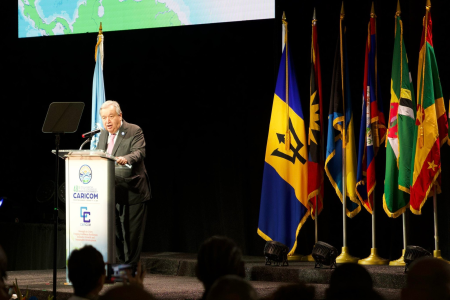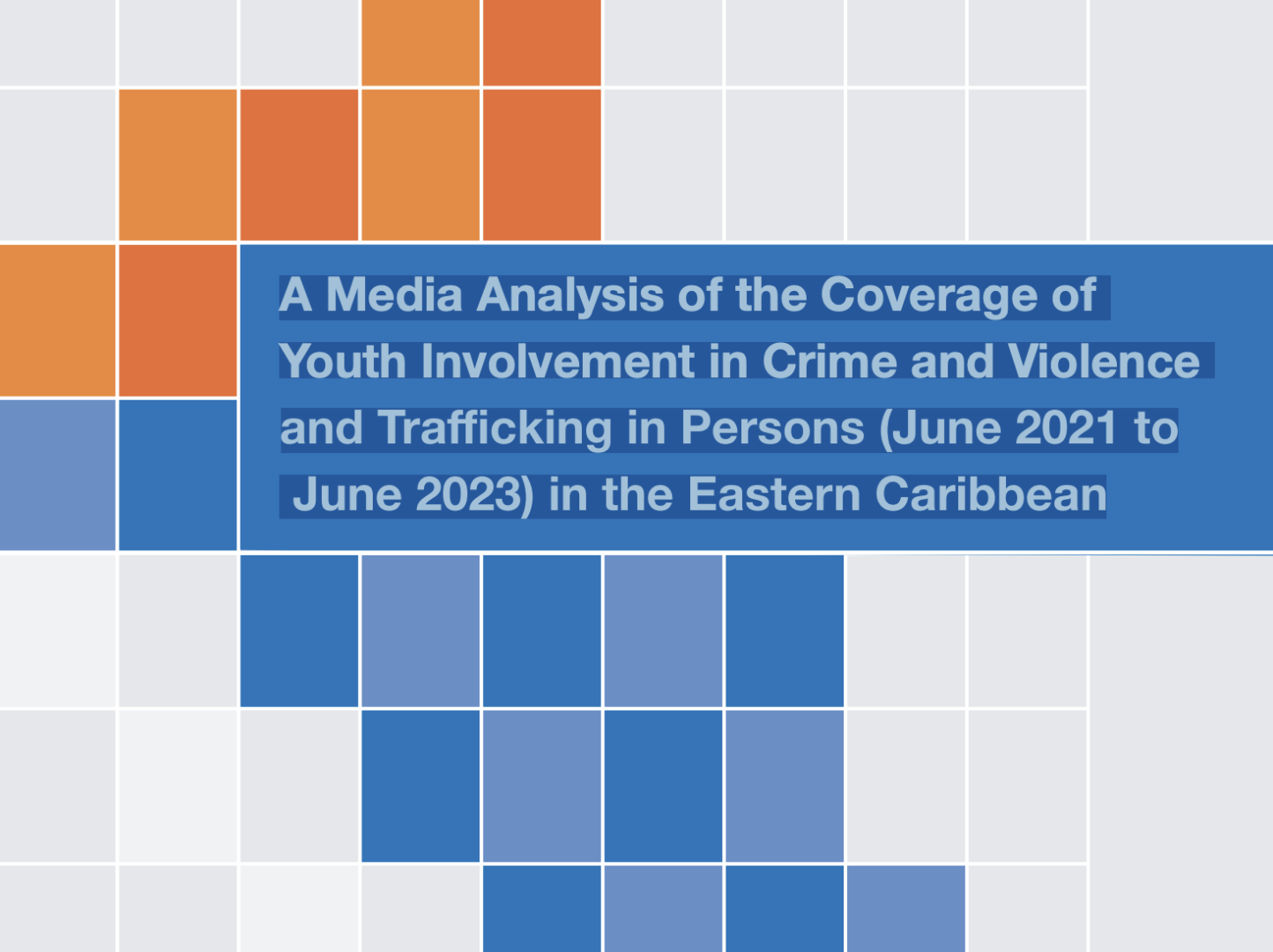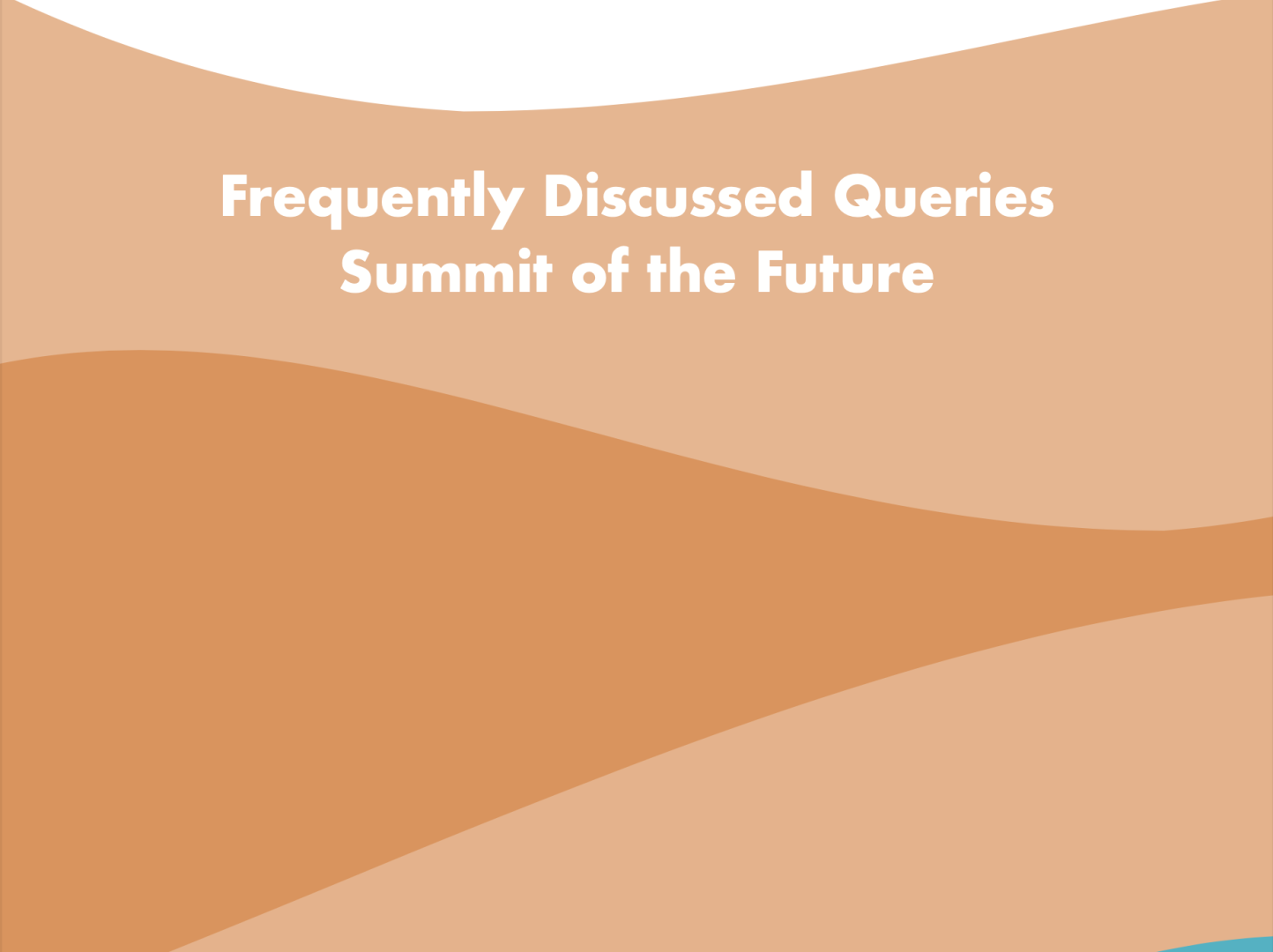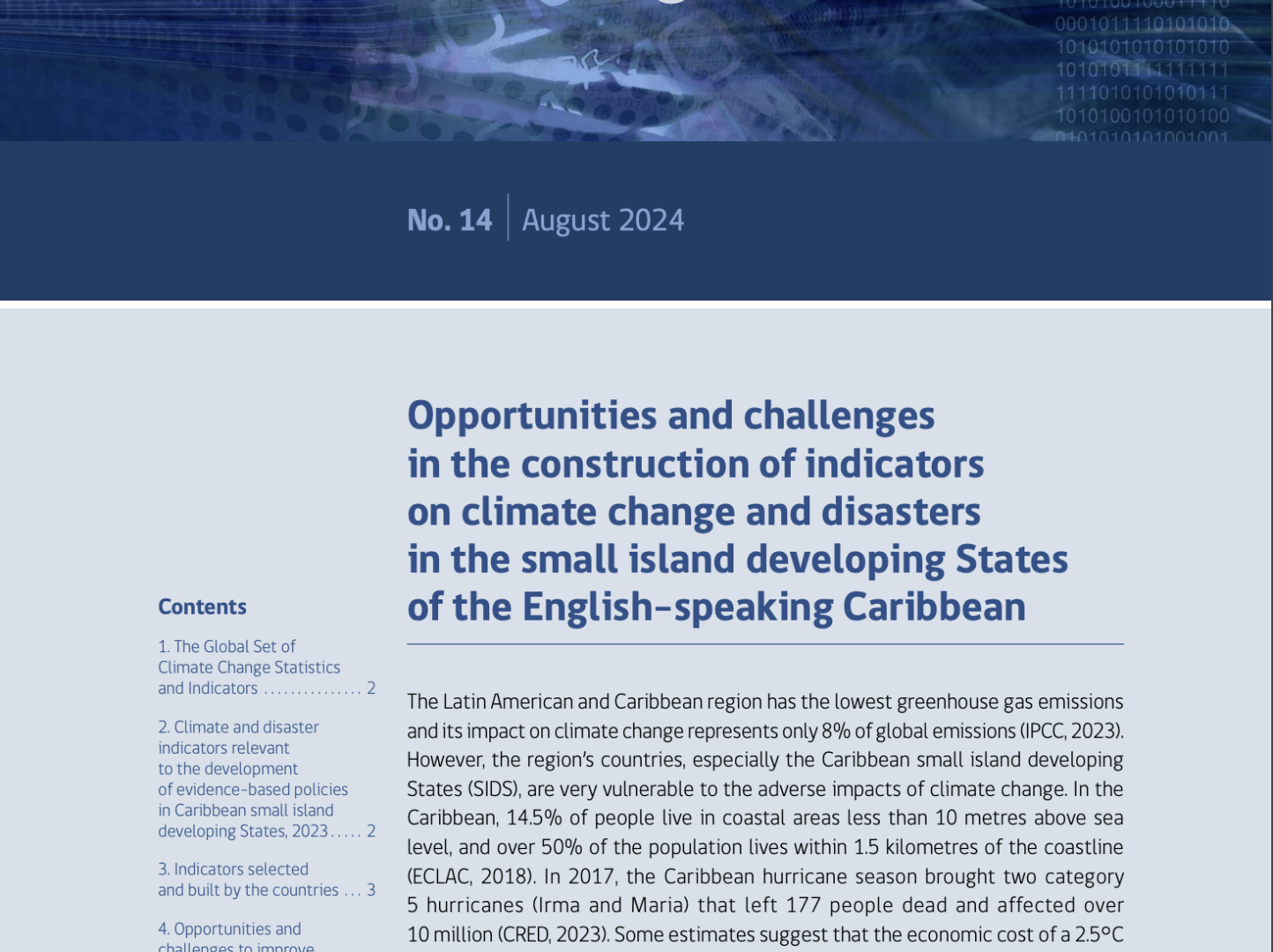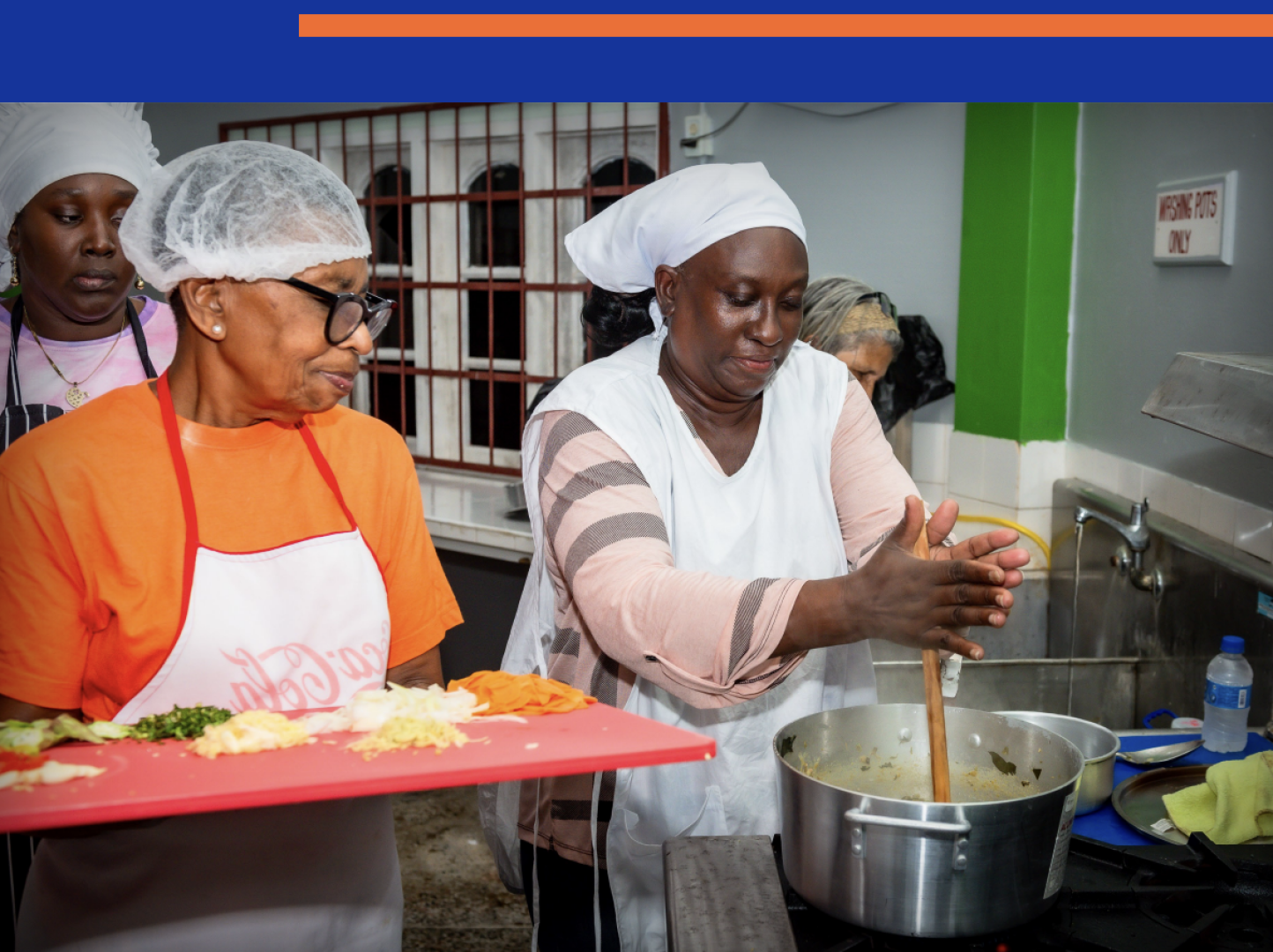Latest
Story
07 March 2025
Caribbean trade unions unite to shape a new social contract at ILO conference
Learn more
Story
25 February 2025
Inside the effort to save an iconic Caribbean coral reef
Learn more
Story
19 February 2025
Guterres declares ‘trouble in paradise’ in support appeal for the Caribbean
Learn more
Latest
The Sustainable Development Goals in the Caribbean
The Sustainable Development Goals are a global call to action to end poverty, protect the Earth’s environment and climate, and ensure that people everywhere can enjoy peace and prosperity. The United Nations in the Caribbean is supporting delivery on all 17 goals:
Story
19 December 2024
Understanding the legacy of slavery: UN commemorations in human rights advocacy
United Nations International Days, Weeks, Years and Decades communicate about, foster deeper understanding, and encourage action on key issues affecting the individuals and communities we serve. These commemorations form a critical pillar in the outreach and advocacy strategies of United Nations Information Centres (UNICs) and Services tasked with connecting local and regional audiences with the work of the United Nations. In the International Days calendar, there are several observances that encourage continuous engagement with the legacy of slavery and promote understanding of its pervasive and harmful influence, including the brutal interruption of African history and the lasting impact of racism and economic marginalisation on People of African Descent. These International Days honour those who suffered at the hands of the Transatlantic Slave Trade and Slavery and affirm the significance of its Abolition as an historical event, raise awareness of contemporary forms of human trafficking and enslavement, and campaign against the economic and social marginalisation wrought by all expressions of racism and racial discrimination. They also mobilise action and celebrate ongoing resistance to, and triumph over, this legacy. Within this framework, the United Nations Outreach Programme on the Transatlantic Slave Trade and Slavery collaborated with the Rijksmuseum to present the exhibit Slavery: ten true stories of Dutch Colonial Slavery at United Nations sites worldwide, beginning with a hosting event at United Nations Headquarters, New York, in 2023. The exhibit as originally created, comprises audio-visual artefacts and print material that tell stories from a range of perspectives of the experience of the slave trade and slavery during the Dutch colonial period. To make these stories available to audiences outside the Netherlands, the Rijksmuseum developed a poster version as well as online supporting material. Permission to reproduce and display the poster exhibit was made available to the United Nations for use in its outreach. For its 2024 commemoration of the International Day of Remembrance of the Victims of Slavery and the Transatlantic Slave Trade, the United Nations Information Centre for the Caribbean Area (UNIC Caribbean) tapped into the UN Secretariat’s collaboration with the Rijksmuseum to bring the ten true stories exhibit to library users in Trinidad and Tobago. UNIC Caribbean's Slavery and its Legacy travelling exhibit project, a collaboration with the Public Libraries Division of the National Library and Information System (NALIS), showcased the Rijksmuseum’s exhibit with supporting lectures at public and school libraries across the country. This travelling exhibit was the most recent activity in the Centre’s longstanding outreach programme of exhibits, presentations, discussion sessions, and digital campaigns, designed to promote understanding of the significance of the Transatlantic Slave Trade and Slavery and its enduring impact on Caribbean societies. It also built on the UNIC’s partnerships with education and research stakeholders who embrace the UN’s values and support its strategic communications goals. Guiding the UNIC Caribbean approach to this outreach, was the UN’s commitment to the promotion and protection of human rights: the understanding that there are inalienable rights that “everyone is entitled to as a human being - regardless of race, colour, religion, sex, language, political or other opinion, national or social origin, property, birth or other status." (UN observances – Human Rights Day) With these important relationships and frameworks in view, the UNIC’s travelling poster exhibit project aimed to educate and encourage nuanced discussions about the legacy of slavery, drawing on the stories of the Dutch Caribbean colonial experience and perspectives. The exhibit was mounted in seven public libraries across Trinidad and Tobago between July and October, and in three school libraries in November. At the schools, the exhibit showcased the ten true stories poster display and also included discussions led by National Information Officer, Amanda Laurence, on the need to continue to remember slavery as an exercise in applying the lessons of the past to build better societies. The UNIC also hosted an information session that featured the Rijksmuseum’s Head of History, Dr.Valika Smeulders, to brief NALIS librarians about the travelling exhibit project and encourage their participation in all dimensions of the Centre’s human rights advocacy. , filtered_html
1 of 5
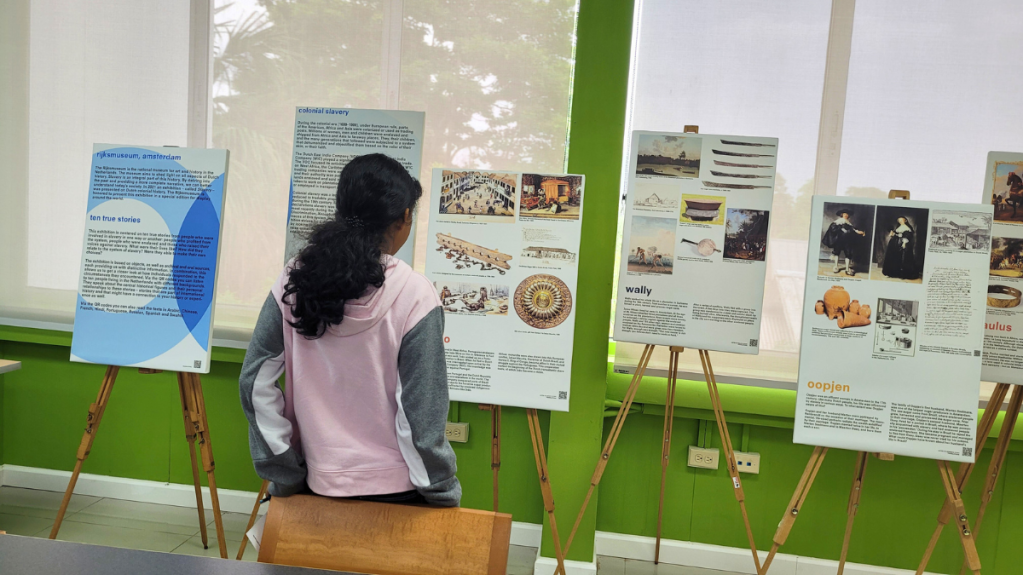
Story
20 February 2024
Decide to join the United Nations as a UN Volunteer
You can decide to change the lives of others while changing your own as a United Nations Volunteer (UNV). Volunteering for the UN is a full-time commitment to peace and sustainable development with a UN agency, fund or programme, in your country or abroad. RIGHTS AND BENEFITSThe United Nations Volunteers (UNV) programme encourages broad and inclusive participation, and as such ensures a variety of benefits to secure a basic standard of living while serving as a UN Volunteer. Benefits include: Monthly living allowance Medical insurance (including dependents) Annual leave (2.5 days per month served) Learning opportunities Reasonable accommodation for persons with disabilities Travel allowance for international UN Volunteers See more on the UNV Conditions of Service : https://bit.ly/UNV-COS PROFESSIONAL PROFILESBuild on your professional experience and knowledge - whether in development, emergency response, education, health, environment, communications, social work and much more. ASSIGNMENT TITLESSome of the most popular volunteer assignment titles are: Field Officer (in a wide variety of areas) Community Development Officer Communications Officer Protection/Human Rights Officer Monitoring & Evaluation Officer MAIN PARTNERSAs a UN Volunteer you can serve with the following UN entities, among others: United Nations Children's Fund (UNICEF) United Nations Development Programme (UNDP) UN Refugee Agency (UNHCR) International Organization for Migration (IOM) UN High Commissioner for Human Rights (OHCHR) United Nations Population Fund (UNFPA) World Food Programme (WFP) In 2022, over 2,500 UN Volunteers served with over 30 UN partners in Latin America and the Caribbean! LEAVING NO ONE BEHINDThe UNV programme is committed to representing the diversity of the world's societies. If you are a person with disabilities, a member of the LGTBQ+, afro-descendant or indigenous communities, or any other minority, you are encouraged to apply. CATEGORIESAssignments are offered into four volunteer categories, which determine eligibility: Expert: candidates must be at least 35 years old and have more than 15 years of professional experience. Specialist: candidates must be at least 27 years of age and have at least 3 years of professional experience. Youth and University: candidates must be between 18 and 26 years of age, and no previous professional experience is required. Community: No previous professional experience or academic requirements needed but must live in the community they serve. Before applying, we recommend carefully reading the specific requirements of your selected assignment. DECIDE TO APPLYRegister in UNV’s Unified Volunteer Platform: app.unv.org, complete your professional profile and apply to vacancies NOW. When filtering vacancies, verify the volunteer category (Expert, Youth, etc.) you fit in and define whether to volunteer in your country or abroad. UN Volunteer opportunities reflect the evolving needs of UN agencies, funds and programmes. We encourage you to visit the UNV platform regularly, so as not to miss any opportunity. VOLUNTEER ONLINEWith the Online Volunteering service, you can undertake volunteer tasks for up to 20 hours a week and for a maximum of 12 weeks with different United Nations entities, governments, public institutions and civil society organisations. As the Online Volunteering service is a free time commitment, selected individuals are not under contract with the UN Volunteers programme or the host entity. As such, Online Volunteers are not eligible for the entitlements and benefits stipulated in the Conditions of Service. Their contribution is recognised with a certificate. Know more here: https://www.unv.org/become-online-volunteer , filtered_html
1 of 5
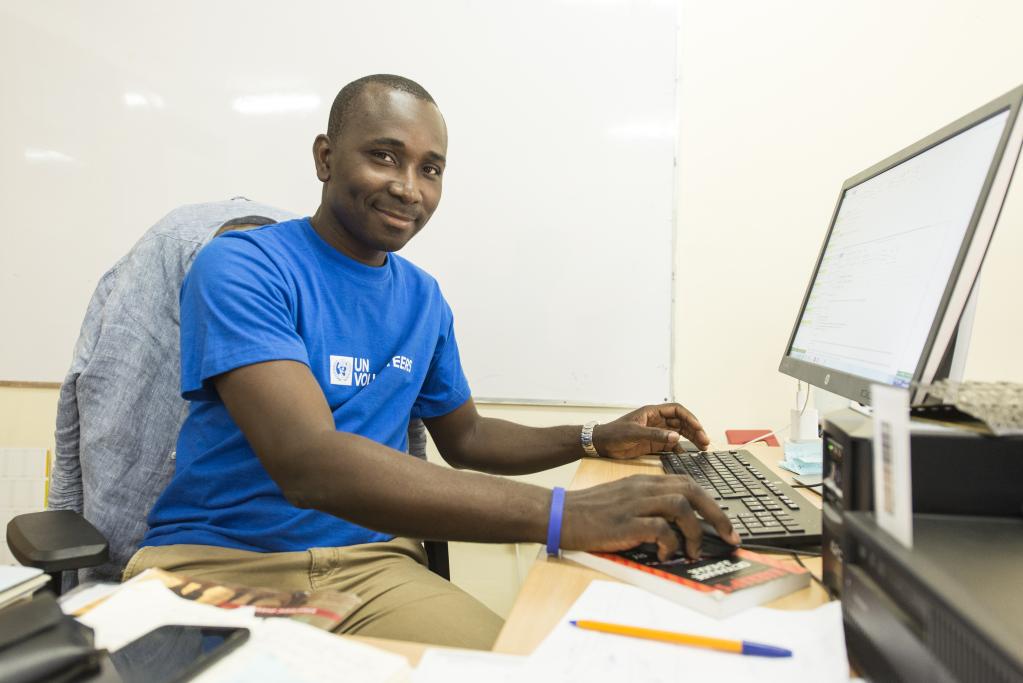
Story
23 September 2024
Pact for the Future: World leaders pledge action for peace, sustainable development
The Pact along with its annexes, the Global Digital Compact and the Declaration on Future Generations, was adopted by consensus, despite a last-minute proposal for an amendment by some countries, including Russia, Iran, the Democratic People’s Republic of Korea (DPRK) and Syria.The amendment sought to incorporate text calling for non-intervention in any issue of national sovereignty, and the primacy of intergovernmental deliberation, in effect, downplaying the role of the civil society or private sector interests. It was rejected after the 193-member Assembly decided not to act on the proposal.Click here for UN News’ live coverage of the meeting and here to download the resolution.Pact for the FutureThe Pact’s five broad focus areas include: sustainable development; international peace and security; science and technology; youth and future generations and transforming global governance.This has become an urgent pivot, as multilateral financial institutions and even the United Nations itself have come up short seeking solutions to 21st century problems, the pact lays out.By endorsing the Pact, UN Member States pledged, among other things, to:Turbocharge the Sustainable Development Goals (SDGs) and the Paris Agreement on climate change, two landmark 2015 agreements that have seen halting progress and missed milestonesListen to young people and include them in decision-making, at the national and global levelsBuild stronger partnerships with civil society, the private sector, local and regional authorities and moreRedouble efforts to build and sustain peaceful, inclusive and just societies and address the root causes of conflictsProtect all civilians in armed conflictAccelerate the implementation of our commitments on women, peace and securityGlobal Digital CompactThe Global Digital Compact marks the first truly worldwide agreement on the international regulation of artificial intelligence (AI) and is founded on the idea that technology should benefit everyone.It outlines commitments to ensure that digital technologies contribute to sustainable development and human rights, while addressing risks like digital divides, cybersecurity, and misuse of technology.The Compact aims to bridge the digital divide and ensure AI technologies are used responsibly, fostering global cooperation on both AI capabilities and security threats. Governments are also obligated to form an impartial worldwide Scientific Panel on AI and start an international conversation about AI governance inside the UN.Declaration on Future GenerationsThe Declaration on Future Generations focuses on securing the well-being of future generations, also highlighting the need to include their interests in decision-making processes.It also underlines the importance of protecting the environment, promoting intergenerational equity, and ensuring that long-term consequences of today's actions are considered. New opportunitiesSpeaking after the adoption, Secretary-General António Guterres emphasized that the Pact for the Future and its annexes, “open pathways to new possibilities and opportunities.”“People everywhere are hoping for a future of peace, dignity, and prosperity. They are crying out for global action to solve the climate crisis, tackle inequality, and address new and emerging risks that threaten everyone,” he said.“They see the United Nations as essential to solving these challenges,” he continued, adding “the Summit of the Future sets a course for international cooperation that can meet their expectations … now, let’s get to work.”Months of negotiationThe adoption was the culmination of months of negotiations co-facilitated by Germany and Namibia.Speaking after the adoption, Philémon Yang, President of the 79th session of the General Assembly, urged nations to move forward, together, in a spirit of solidarity and multilateral cooperation.“The path we choose must lead to a future where human dignity is respected and human rights are upheld. A future where peace transcends the mere absence of conflict and is grounded in justice, inclusion, and equity.” This story was first published to UN News, filtered_html
1 of 5

Story
25 June 2024
UN Secretary-General launches UN Global Principles for Information Integrity
The world must respond to the harms caused by the spread of hate and lies online while vigorously defending human rights, United Nations Secretary-General António Guterres said at the launch of the United Nations Global Principles for Information Integrity, 24 June 2024.One year after launching his report on information integrity on digital platforms, the Secretary-General presented a framework for coordinated international action to make information spaces safer and more humane, one of the most urgent tasks of our time.Misinformation, disinformation, hate speech, and other risks to the information ecosystem are fueling conflict, threatening democracy and human rights, and undermining public health and climate action. Their proliferation is now enhanced by the rapid rise of easily accessible Artificial Intelligence (AI) technologies, increasing the threat to some groups often targeted in information spaces, including children. "The United Nations Global Principles for Information Integrity aim to empower people to demand their rights," said the Secretary-General. "At a time when billions of people are exposed to false narratives, distortions, and lies, these principles mark a clear way forward, firmly rooted in human rights, including the right to freedom of expression and opinion." The UN chief urgently called on governments, technology companies, advertisers, and the public relations industry to take responsibility for disseminating and monetizing harmful content.The erosion of information integrity is compromising the UN's missions, operations, and priorities, including vital peacekeeping operations and humanitarian efforts. In a global survey of UN staff, 80% of respondents said that damaging information puts them and the communities they serve at risk.The principles result from extensive consultations with member states, the private sector, youth leaders, media, academia, and civil society. The recommendations in this document are designed to foster healthier and safer information spaces that promote human rights, peaceful societies, and a sustainable future.The 5 Global Principles for a more humane information ecosystem are: What do these principles include?Governments, technology companies, advertisers, media, and other stakeholders should refrain from using, supporting, or amplifying disinformation and hate speech for any purpose.Governments should facilitate timely access to information, ensure a free, viable, independent, and pluralistic media landscape, and ensure robust protection for journalists, researchers, and civil society.Technology companies should ensure security and privacy by design in all their products, along with consistent application of policies and remedies across countries and languages, with particular attention to the needs of groups often targeted online. They must improve their response and take steps to support the integrity of information during elections.All parties involved in developing Artificial Intelligence (AI) technologies must take urgent, immediate, inclusive, and transparent steps to ensure that all AI applications are designed, implemented, and used safely, responsibly, and ethically to respect human rights.Technology companies must develop business models that do not rely on programmatic advertising and that do not prioritize engagement over human rights, privacy, and security. These models must allow users greater choice and control over their online experience and personal data.Advertisers should demand transparency in the technology sector's digital advertising processes to help ensure that advertising budgets do not inadvertently fund disinformation, hate, or undermine human rights.Tech companies and AI developers should ensure meaningful transparency, allow researchers and academics access to data while respecting user privacy, commission publicly available independent audits, and co-develop accountability frameworks for the industry.Governments, technology companies, AI developers, and advertisers should take special measures to protect and empower children, and governments must provide resources to parents, guardians, and educators."Everyone should be able to express themselves freely without fear of attack. Everyone should be able to access diverse opinions and sources of information. No one should be at the mercy of an algorithm that they do not control, that was not designed to safeguard their interests, and that tracks their behavior to collect personal data and keep them hooked," stressed the Secretary-General during the presentation of the Global Principles, placing particular emphasis on the situation of vulnerability in which millions of girls and boys find themselves."The UN listens to your pleas for guidance and support. Do not be discouraged: raise your voice. Demand accountability, demand choice, demand control. You are the majority. And this is a fight we can win together," concluded António Guterres (Read the Secretary-General's entire message).For her part, UN Under-Secretary-General for Global Communication Melissa Fleming also urgently called on people to respect the integrity of information, especially those who create artificial intelligence."AI creators: make sure you don't make the same mistakes as social network creators. Make sure you are safe by design, make sure you make branded content, and remove content that fails to comply with the principles," he said.Background:The UN Global Principles for Information In "AI creators: make sure you don't make the same mistakes as social network creators. Make sure you are safe by design, make sure you make branded content, and remove content that fails to comply with the principles," he said. integrity arises from a proposal in Our Common Agenda, the Secretary-General's 2021 report outlining a vision for the future of global cooperation and multilateral action. The Principles are a resource for member states ahead of the Summit of the Future to be launched next September.-----The Universal Principles for Information Integrity are available at:https://www.un.org/es/information-integrityView a video presentation of the Universal Principles at: https://webtv.un.org/en/asset/k1c/k1c1nfpy8n, filtered_html
1 of 5

Story
01 July 2024
World getting a ‘failing grade’ on Global Goals report card
The 2024 Sustainable Development Goals Report highlighted that nearly half the 17 targets are showing minimal or moderate progress, while over a one-third are stalled or going in reverse, since they were adopted by UN Member States back in 2015 to bring peace and prosperity for people and the planet. “This report is known as the annual SDG report card and it shows the world is getting a failing grade,” UN Secretary-General António Guterres said at the press conference to launch the comprehensive stocktake.“The takeaway is simple – our failure to secure peace, to confront climate change and to boost international finance is undermining development. We must accelerate action for the Sustainable Development Goals, and we don’t have a moment to lose,” he stressed.Major obstaclesThe Report identified the lingering effects of the COVID-19 pandemic, escalating conflicts, geopolitical tensions and worsening climate chaos as major obstacles to progress.It noted that an additional 23 million people were pushed into extreme poverty and over 100 million more were suffering from hunger in 2022 compared to 2019, while the number of civilian deaths in armed conflict skyrocketed last year. 2023 was also the warmest on record, with global temperatures nearing the critical 1.5°C threshold.Urgent prioritiesMr. Guterres emphasized the urgency of boosting international cooperation, stating “we must not let up on our 2030 promise to end poverty, protect the planet and leave no one behind.”The report outlined key priorities to address the deficit.Foremost, it highlighted the need for financing for development. The SDG investment gap in developing countries is $4 trillion per year. It is crucial to rapidly increase funding and fiscal space, as well as reform the global financial system to unlock funding. Resolving conflicts through dialogue and diplomacy is equally crucial. With nearly 120 million forcibly displaced people by May 2024 and a 72 per cent increase in civilian casualties between 2022 and 2023, the need for peace is more pressing than ever.In parallel, a surge in implementation is desperately needed. Massive investments and effective partnerships are vital to drive transitions in key areas such as food, energy, social protection, and digital connectivity.Seize the momentThe report comes ahead of the High-Level Political Forum on Sustainable Development (HLPF), taking place at the UN Headquarters, in New York, from 8 to 17 July.Under the auspices of the Economic and Social Council (ECOSOC), the Forum will review global progress towards Goal 1 on ending poverty, Goal 2 on zero hunger, Goal 13 on climate action, Goal 16 on peaceful and inclusive societies, and Goal 17 on means of implementation.In addition, the upcoming Summit of the Future in September will be pivotal for realigning efforts towards achieving the Goals. The Summit aims to address the debt crisis affecting many developing countries and the urgent need to reform international financial architecture.Key findingsThe SDG Report highlights stark economic challenges, with per-capita gross domestic product (GDP) growth in half of the world’s most vulnerable nations slower than in advanced economies. Nearly 60 per cent of countries faced abnormally high food prices in 2022, exacerbating hunger and food insecurity.The report also highlighted gender inequality, noting that 55 per cent of 120 surveyed countries lack laws prohibiting discrimination against women.It also cited education as a significant concern, with only 58 per cent of students worldwide achieving minimum proficiency in reading by the end of primary school. At the same time, despite global unemployment reaching a historic low of five per cent in 2023, many obstacles to achieving decent work across all societies persist.However, there are positive developments in renewable energy, which expanded at a rate of 8.1 per cent annually over the past five years.Technological advancements also saw significant strides, with mobile broadband accessibility (3G or higher) increasing to 95 per cent of the world’s population from 78 per cent in 2015. .....................................................This story was first published by UN News.
, filtered_html
, filtered_html
1 of 5
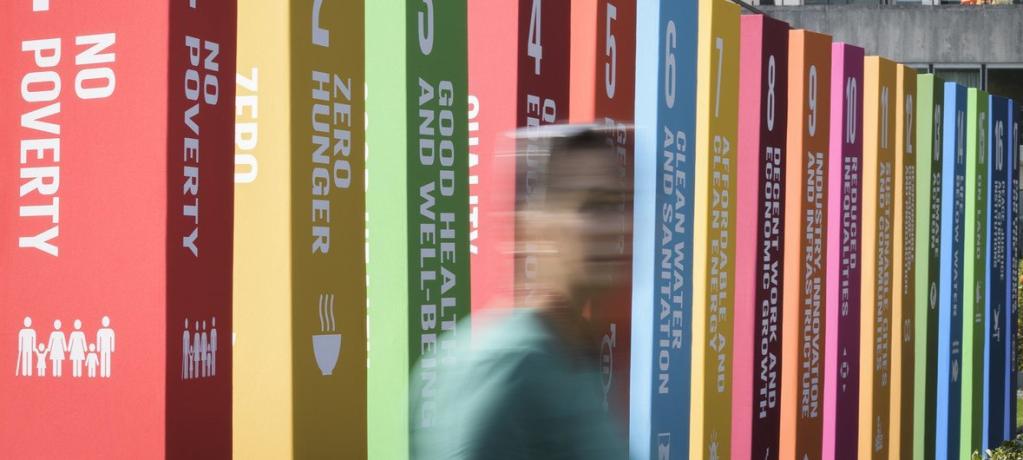
Story
11 March 2025
Caribbean trade unions unite to shape a new social contract at ILO conference
BRIDGETOWN, Barbados (ILO News) – The Conference on the New Social Contract - A Trade Union Perspective for the Caribbean, held on 25-26 February 2025, marked a pivotal moment for workers’ rights and social justice in the region. Organized by the International Labour Organization’s (ILO) Bureau for Workers’ Activities (ACTRAV), the event brought together labour leaders, policymakers and international experts to discuss the urgent need for stronger labour protections, economic inclusion, and social justice in the Caribbean.The regional forum provided a space for Caribbean trade unions to address challenges, share strategies, and shape a stronger social contract at national and regional levels. It also set the stage for their participation in the Second World Summit for Social Development in 2025 and discussions on the agenda 2030. Key takeaways from the ConferenceStrengthening workers’ rights: Trade union leaders called for a revised social contract that ensures fair wages, better working conditions, and enhanced social protections for all workers, including those in the informal economy.Climate change and Just Transition: Experts emphasized the need for policies that support workers in shifting towards greener and more sustainable jobs, while protecting vulnerable communities from economic disruptions.Technology and the future of work: Discussions focused on the impact of automation and artificial intelligence, highlighting the need for digital skills training and policies that safeguard workers’ livelihoods.Tripartite cooperation: Government officials, employers, and trade unions reinforced the importance of social dialogue in shaping inclusive labour policies that benefit all sectors of society.Pro-employment macroeconomic policies: Participants stressed the importance of a macroeconomic policies that promotes social and labour issues as key steps to achieve sustainable development and a renewed social contract in the Caribbean.The gathering centered on the concept of a new social contract and examined how existing contracts have failed in providing for the needs of workers. Two key aspects were explored in depth: macroeconomic policies for inclusive and decent job-rich productivity and economic growth, and essential protections for all workers. These are the main drivers that public policies could leverage to build inclusive, sustainable, resilient, and equitable economies that create decent work while protecting workers’ rights and living standards. Trade unions play a crucial role in addressing the specific needs of vulnerable groups, ensuring no one is left behind.Delivering the keynote address, The Honourable Colin E. Jordan, Minister of Labour, Social Security, and Third Sector of Barbados, highlighted the importance of solidarity in shaping a just future for Caribbean workers. He emphasized that, “Social justice must become a lived reality for all of us in the Caribbean who are existing in this space. The new social contract must address how do we make social justice real for our people in the Caribbean, real for workers, real for employers, real for civil society.” Minister Jordan also called for greater regional collaboration in tackling challenges such as climate change, automation, and the informal economy, reinforcing the Government's commitment to policies that put people first.The Conference also explored the role of Caribbean nations in advancing global labour standards. Ms. Maria Helena André, Director of the Bureau for Workers’ Activities at the ILO, stressed, “Multilateralism as a whole is under attack, the geopolitical landscape is increasingly hostile, and the ideals of democracy as a catalyst for social cohesion, peace, and prosperity are being increasingly challenged. It is therefore of critical importance to engage, and to foster dialogue on how to strengthen the resolve and resilience of the Caribbean region.”During the panel discussion on establishing a New Social Contract: Limitations of existing governance structures at national and international levels in light of transformational change in the world of work and the way forward, Mr. André Lewis, President of the Caribbean Congress of Labour, emphasized, “The lack of enforcement in labour rights throughout the labour administration system is what we see as compromising, to a very large extent, a lot of what is happening in the world of work.”Mr. Ruben McSween, President of the Caribbean Employers’ Confederation, added, “I really think the role of government institutions must be to modernize the social contract by ensuring universal social protection , fair wages and agreed upon prescribed productivity standard."The event concluded with a resounding call by Ms. Maria Helena André for collective action to translate these discussions into concrete policies and practices. "The push for a renewed social contract and social justice is a pivotal moment for unions. It's not a time to stand back, but to actively engage in implementing the changes you want to see. This requires greater collaboration and extending organizing efforts to include those often overlooked, ensuring that the discussion translates into real solutions for workers and enterprises in the Caribbean."About the New Social ContractThe world is undergoing a significant transformation, driven by changing patterns in globalization, rapid technological change and the ever-present climate crisis. These changes are profoundly affecting the world of work, threatening sustainable economic development and social cohesion in many countries. This has challenged the capacity of many governments to provide adequately for its people and to honour its social contract, given the fact that regulatory systems, structural reforms and other public policies are oftentimes not keeping up with changes in the world of work.The concept of a "new social contract" emerges as a framework to redefine state-society relations. It provides an opportunity to take stock of the existing social contract between the state and its people, and to assess whether it is on the one hand adapting to the transformation changes, and on the other, is inclusive enough to cover all, particularly those in vulnerable situations.
Thus, this new social contract should aim to ensure social progress, justice, and inclusivity in all aspects of social and economic life. It should conceivably emphasize the crucial role of the labour market in aligning economic, social, and employment priorities to ensure everyone benefits from economic development through decent work and social protection....................................................................For more information, visit the Conference’s web page or contact Vera Guseva guseva@ilo.orgThis story was first published by ILO Caribbean., filtered_html
Thus, this new social contract should aim to ensure social progress, justice, and inclusivity in all aspects of social and economic life. It should conceivably emphasize the crucial role of the labour market in aligning economic, social, and employment priorities to ensure everyone benefits from economic development through decent work and social protection....................................................................For more information, visit the Conference’s web page or contact Vera Guseva guseva@ilo.orgThis story was first published by ILO Caribbean., filtered_html
1 of 5
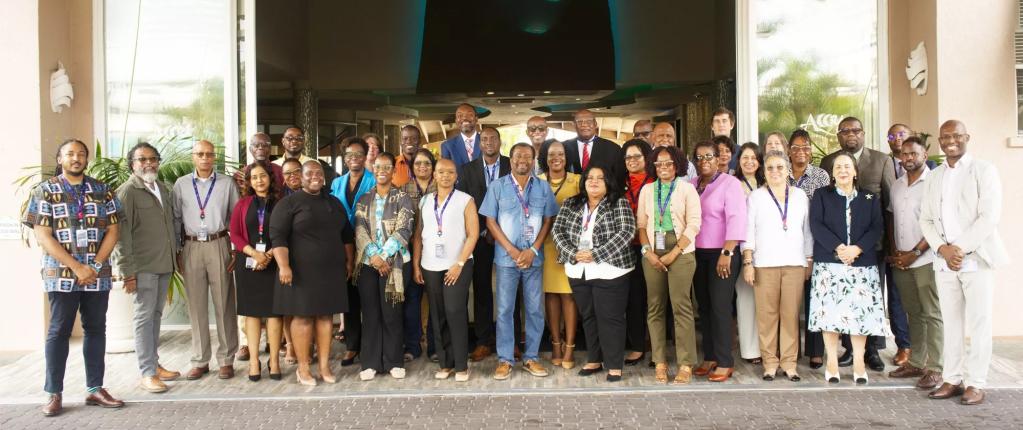
Story
28 February 2025
Inside the effort to save an iconic Caribbean coral reef
Stretching 1,000 km along the coasts of Belize, Guatemala, Honduras and Mexico, the Mesoamerican Reef is an ecological marvel. The largest barrier reef in the Western Hemisphere, it is a living, breathing world, home to dazzling biodiversity, including 60 varieties of coral. However, this vital ecosystem faces mounting threats from pollution and climate change, say experts.
To counter those perils, the United Nations Environment Programme (UNEP), the United Nations Capital Development Fund, the United Nations Development Programme and the Global Fund for Coral Reefs (GFCR) have launched an ambitious drive to channel funding towards initiatives designed to preserve the reef. Through the Mesoamerican Reef Fund, the GFCR is providing technical advice and financing to 50 early-stage, reef-friendly businesses from countries in the region. The work spans 1.7 million hectares of coral reefs and is creating economic opportunities for 15,000 people. "Investing in local organizations with deep-rooted knowledge and experience in coral reef conservation is critical for protecting the Mesoamerican Reef and for achieving the UN’s Sustainable Development Goals,” says Susan Gardner, Director of UNEP’s Ecosystems Division. “These local organizations are uniquely positioned because people benefit directly from healthy reefs. Healthy reefs mean more fish, providing families with better nutrition and higher incomes, fundamental for accessing healthcare, education and building resilience.” One of the projects the Mesoamerican Reef Fund supports focuses on raising juvenile king crabs and releasing them onto reefs to combat the overgrowth of macroalgae, which thrives due to rising ocean temperatures associated with climate change. Macroalgae crowd out corals, weakening reef ecosystems. King crabs, which are native to the area, have voracious algae appetites and can help control algae without harming coral. However, their low natural population density limits their impact. By increasing crab populations, this project aims to restore balance to the ecosystem, benefiting coral health and providing a sustainable income source for local fishers. To combat pollution, another major threat to corals, the Mesoamerican Reef Fund is helping the Royal Mayan Shrimp Farm in Belize become more sustainable, including by recycling its wastewater. Traditional shrimp farms often spew polluted water into the ocean and cut down mangrove forests, key coastal ecosystems. Meanwhile in Mexico, the Mesoamerican Reef Fund is supporting a company, CarbonWave, which turns a type of seaweed known as sargassum into raw materials for various products, including biofuels, animal feed, fertilizers, textiles and cosmetics. This prevents sargassum from smothering corals and wildlife or ending up in landfills where it decays, potentially polluting groundwater. One of the products CarbonWave has created from sargassum is Sarga Extra, an organic fertilizer. The product also reduces farmers’ use of nitrogen-based fertilizers, a chemical runoff that exacerbates sargassum blooms and can create ocean dead zones. Coral reefs, which cover less than 1 per cent of the ocean floor but support 25 per cent of all marine life, play a critical role in food security, coastal protection and livelihoods in climate-vulnerable regions. But in the last 15 years the world has lost 14 per cent of its coral reefs, some of which have existed for as much as 5,000 years. The die off has been driven by rising sea temperatures, pollution and unsustainable fishing practices. The Global Fund for Coral Reefs (GFCR)The Global Fund for Coral Reefs is a UN-backed multi-partner trust fund. It provides grants and loans to coral-reef-positive enterprises worldwide, supporting initiatives from ecotourism to sustainable aquaculture to seaweed farming. The GFCR’s goal is to support over 400 reef-positive businesses and create more than 30,000 jobs by 2030. Long term, the Mesoamerican Reef Fund is aiming to leverage US$60 million in private capital and enhance the resilience of over 3 million coastal residents. Each reef-positive enterprise in the GFCR’s pipeline addresses threats to reef health while supporting poverty alleviation and contributing to the financial sustainability of marine protected areas, safe havens for sea life. “The fund’s projects show that even modest investments in biodiversity conservation can unlock remarkable innovation and impact,” says UNEP’s Susan Gardner. “In the face of mounting threats to coral reefs, this multiplying effect is exactly what we need right now.” ..............................................................................................This story was first published by the UN Environment Programme (UNEP)., filtered_html
To counter those perils, the United Nations Environment Programme (UNEP), the United Nations Capital Development Fund, the United Nations Development Programme and the Global Fund for Coral Reefs (GFCR) have launched an ambitious drive to channel funding towards initiatives designed to preserve the reef. Through the Mesoamerican Reef Fund, the GFCR is providing technical advice and financing to 50 early-stage, reef-friendly businesses from countries in the region. The work spans 1.7 million hectares of coral reefs and is creating economic opportunities for 15,000 people. "Investing in local organizations with deep-rooted knowledge and experience in coral reef conservation is critical for protecting the Mesoamerican Reef and for achieving the UN’s Sustainable Development Goals,” says Susan Gardner, Director of UNEP’s Ecosystems Division. “These local organizations are uniquely positioned because people benefit directly from healthy reefs. Healthy reefs mean more fish, providing families with better nutrition and higher incomes, fundamental for accessing healthcare, education and building resilience.” One of the projects the Mesoamerican Reef Fund supports focuses on raising juvenile king crabs and releasing them onto reefs to combat the overgrowth of macroalgae, which thrives due to rising ocean temperatures associated with climate change. Macroalgae crowd out corals, weakening reef ecosystems. King crabs, which are native to the area, have voracious algae appetites and can help control algae without harming coral. However, their low natural population density limits their impact. By increasing crab populations, this project aims to restore balance to the ecosystem, benefiting coral health and providing a sustainable income source for local fishers. To combat pollution, another major threat to corals, the Mesoamerican Reef Fund is helping the Royal Mayan Shrimp Farm in Belize become more sustainable, including by recycling its wastewater. Traditional shrimp farms often spew polluted water into the ocean and cut down mangrove forests, key coastal ecosystems. Meanwhile in Mexico, the Mesoamerican Reef Fund is supporting a company, CarbonWave, which turns a type of seaweed known as sargassum into raw materials for various products, including biofuels, animal feed, fertilizers, textiles and cosmetics. This prevents sargassum from smothering corals and wildlife or ending up in landfills where it decays, potentially polluting groundwater. One of the products CarbonWave has created from sargassum is Sarga Extra, an organic fertilizer. The product also reduces farmers’ use of nitrogen-based fertilizers, a chemical runoff that exacerbates sargassum blooms and can create ocean dead zones. Coral reefs, which cover less than 1 per cent of the ocean floor but support 25 per cent of all marine life, play a critical role in food security, coastal protection and livelihoods in climate-vulnerable regions. But in the last 15 years the world has lost 14 per cent of its coral reefs, some of which have existed for as much as 5,000 years. The die off has been driven by rising sea temperatures, pollution and unsustainable fishing practices. The Global Fund for Coral Reefs (GFCR)The Global Fund for Coral Reefs is a UN-backed multi-partner trust fund. It provides grants and loans to coral-reef-positive enterprises worldwide, supporting initiatives from ecotourism to sustainable aquaculture to seaweed farming. The GFCR’s goal is to support over 400 reef-positive businesses and create more than 30,000 jobs by 2030. Long term, the Mesoamerican Reef Fund is aiming to leverage US$60 million in private capital and enhance the resilience of over 3 million coastal residents. Each reef-positive enterprise in the GFCR’s pipeline addresses threats to reef health while supporting poverty alleviation and contributing to the financial sustainability of marine protected areas, safe havens for sea life. “The fund’s projects show that even modest investments in biodiversity conservation can unlock remarkable innovation and impact,” says UNEP’s Susan Gardner. “In the face of mounting threats to coral reefs, this multiplying effect is exactly what we need right now.” ..............................................................................................This story was first published by the UN Environment Programme (UNEP)., filtered_html
1 of 5

Story
19 February 2025
Guterres declares ‘trouble in paradise’ in support appeal for the Caribbean
"The exquisite beauty of the Caribbean is famed the world over. But there is trouble in paradise."United Nations Secretary-General António Guterres sounded the alarm in his address to Caribbean leaders gathered at the opening ceremony of the 48th Regular Meeting of the Conference of Heads of Government of CARICOM on 19 February 2025 in Barbados.From the ongoing socioeconomic impact of the COVID-19 pandemic, to soaring debt and escalating extreme weather events, Guterres described a region beset by crises beyond its control and called for international solutions. Against the backdrop of these compounding challenges, the CARICOM Summit is taking place at the Lloyd Erskine Sandiford Centre in Bridgetown under the theme ‘Strength in Unity: Forging Caribbean Resilience, Inclusive Growth and Sustainable Development’. Heads of State and Government are expected to address a range of issues, including food security, climate change, reparations for historical injustices and regional integration through the CARICOM Single Market and Economy (CSME).In his address, Guterres outlined three key areas where a unified Caribbean is crucial for progress: Unity for Peace and SecurityGuterres emphasised the urgent need to address the crisis in Haiti, where gang rule has inflicted immense suffering on the population. He said that he would soon report to the United Nations Security Council on the situation in Haiti, including proposals on the role the UN can play to support stability and security and address the root causes of the crisis. "It is my intention to present to the Security Council a proposal that is very similar to the one that we have presented for Somalia in which the UN assumes the responsibility of the structural and logistical expenditures that are necessary to put a force in place and the salaries of the force are paid through the trust fund that already exists. And if the Security Council will accept this proposal, we’ll have the conditions to finally have an effective force to defeat the gangs in Haiti and create the conditions for democracy to thrive."He commended CARICOM's support and reiterated his call for a “political process – owned and led by the Haitians – that restores democratic institutions through elections.”The Secretary-General also urged regional leaders to continue tackling the "weapons and drug trafficking that is fuelling violence across the Caribbean", even while appealing to "countries of origin and countries of destination" for stronger cooperation in waging this battle. Unity for Climate ActionAcknowledging the disproportionate impact of climate change on the Caribbean, Guterres stated, "You face a deplorable injustice: A crisis you have done next to nothing to create is wrecking economies, ruining lives, and threatening your very existence." He called for renewed commitment to limiting global temperature rise to 1.5 degrees Celsius above pre-industrial levels and urged G20 countries to lead in the delivery of ambitious climate action plans. All member States adhering to the Paris Agreement are required to submit new Nationally Determined Contributions (NDCs) in 2025, aimed at mitigating and adapting to climate change. Guterres also stressed the need for increased climate finance, adaptation measures, and meaningful contributions to the Loss and Damage Fund."You must be able to find new innovative sources of financing and namely to finally put serious a price on carbon. Unity for Sustainable DevelopmentGuterres emphasised the global challenges in financing the Sustainable Development Goals (SDGs), noting that debt servicing consumes funds while international financial institutions remain underpowered. He praised Caribbean countries for their leadership in pushing for change, stating, "Caribbean countries have been at the forefront of the fight for change – pioneering bold and creative solutions."The Secretary-General highlighted the progress marked by the Pact for the Future, which commits to advancing an SDG Stimulus of $500 billion a year. He noted that the Pact calls for considering structural vulnerabilities in access to concessional funds, including through the Multidimensional Vulnerability Index (MVI). Additionally, it calls for representation in international financial institutions to "correct for the world's vast inequalities and injustices," and for effective action on debt.Guterres urged the implementation of these commitments and emphasized the importance of ensuring all countries can benefit from sustainable development technologies by delivering on the Global Digital Compact.The Secretary-General concluded his address by acknowledging the power of Caribbean unity. "A unified Caribbean is an unstoppable force. I urge you to keep using that power to push the world to deliver on its promise." — UN Secretary-General António Guterres CARICOM-UN PartnershipThe Secretary-General met with Prime Minister Mia Amor Mottley on the day of the opening ceremony, expressing appreciation of Barbados' active role as current Chair of CARICOM: Caribbean Community.He underscored the strong CARICOM-UN partnership and commended Barbados for spearheading efforts to advance reforms to the international financial architecture through the Bridgetown Initiative 3.0 — a call for urgent and decisive action to reform the framework of institutions, policies, rules, and practices that govern the global financial system.The Secretary-General and the Prime Minister exchanged views on regional and global issues, particularly the situation in Haiti, climate change and the global agenda for antimicrobial resistance. , filtered_html
1 of 5
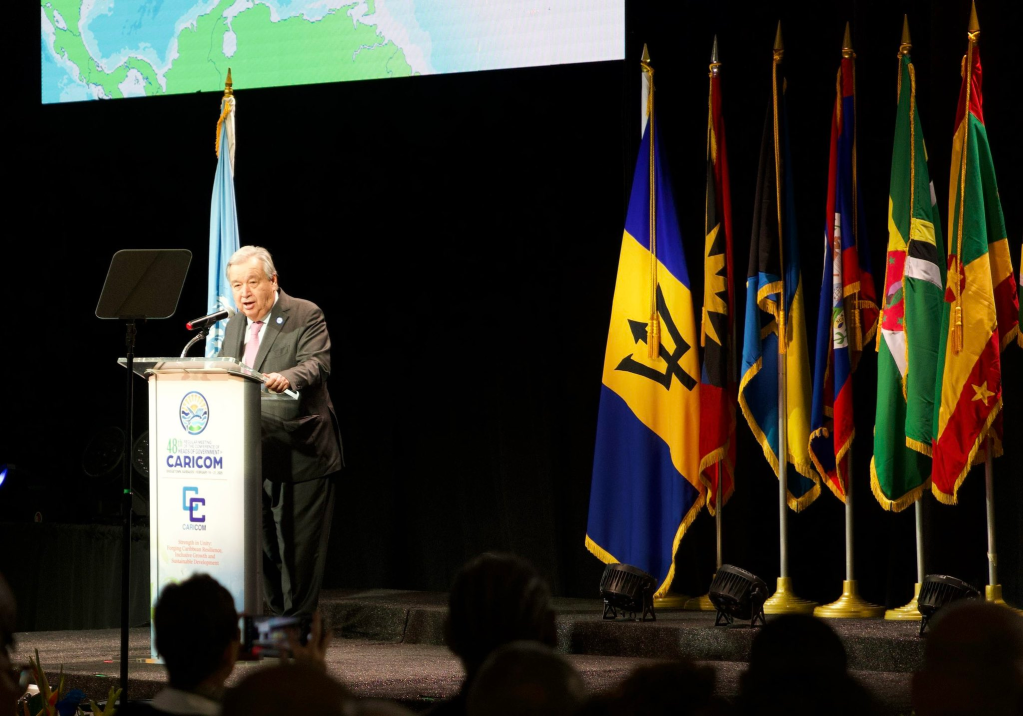
Story
26 February 2025
Barbadian youth lead the way in climate action at UN roundtable event
As climate change intensifies, young people in Barbados are increasingly voicing their concerns for the future, demanding urgent action in one of the world’s most vulnerable regions. Mr. Selwin Hart, Special Advisor to the UN Secretary-General on Climate, joined forces with The Ashley Lashley Foundation this week for a crucial roundtable discussion at the UN House in Barbados, where young leaders came together to discuss climate action and chart a path toward securing a sustainable future for the Caribbean. The event took place just hours before the arrival of UN Secretary-General António Guterres for the 48th Regular Meeting of CARICOM Heads of Government, where he delivered the opening address. This timely gathering brought together passionate climate activists and key stakeholders including Mr. Simon Springett, UN Resident Coordinator for Barbados and the Eastern Caribbean, to tackle pressing issues like the Paris Climate Accords, Nationally Determined Contributions (NDCs), the road to COP 30, and innovative strategies to secure climate finance. “This is a pivotal year for climate action,” said Mr. Hart. “It marks the 10th anniversary of the Paris Agreement, and it’s the year when all countries are revising their Nationally Determined Contributions, updating their climate action plans. I wanted to hear directly from the youth of Barbados to understand what they believe should be included in the country's new climate plans.”He urged the young leaders to remain hopeful and resilient despite the daunting challenges posed by climate change. "Do not give up hope," he encouraged, acknowledging that while there is an increasing global push for renewable energy, temperatures continue to rise beyond safe levels.“We need young people in the Caribbean and around the world to advocate for the highest levels of ambition,” Hart added. “Climate extremes are intensifying. Last year was the hottest year on record, and governments everywhere must prioritize protecting those on the frontlines of this crisis."We're witnessing stronger storms, extreme heatwaves, wildfires, and the most vulnerable populations need protection now more than ever." — Mr. Selwin Hart, Special Advisor to the UN Secretary-General on Climate Mr. Springett expressed optimism about the progress made in fulfilling NDC commitments, emphasizing the need for greater youth involvement in shaping the future of climate action. He highlighted the untapped potential of young people, noting that many of the young attendees at the roundtable were well-versed in complex climate issues, including the Paris Agreement and the mechanics of international climate negotiations.“It’s clear that we have only scratched the surface of what youth can offer to governments and international institutions,” Springett said. "This kind of dialogue sparks innovative ideas that, if taken seriously, could drive transformative change. With youth leading the way, we are unstoppable." — — Simon Springett, UN Resident Coordinator, Barbados and the OECSThe roundtable featured diverse voices, including Maria Marshall, a 15-year-old UNICEF Youth Advocate on climate and the environment. "Once people from different backgrounds are in a room where they feel safe to share their views, we can have meaningful conversations about the issues they face," she said. "Our governments need to prioritize educating youth and the people who work with them, like teachers, about climate change."— Maria Marshall Ocean Campbell, 24, emphasized the importance of youth representation in climate decision-making. "It’s essential for young people to have a seat at the table because the decisions being made today will directly affect our future," Campbell said."At 24 years old, I know I will inherit a world shaped by these decisions. If we want to secure a bright future, we need to be actively involved in shaping it now—those decisions are the building blocks of our tomorrow.”— Ocean Campbell..........................................................................This story was first published by UNICEF Eastern Caribbean., filtered_html
1 of 5
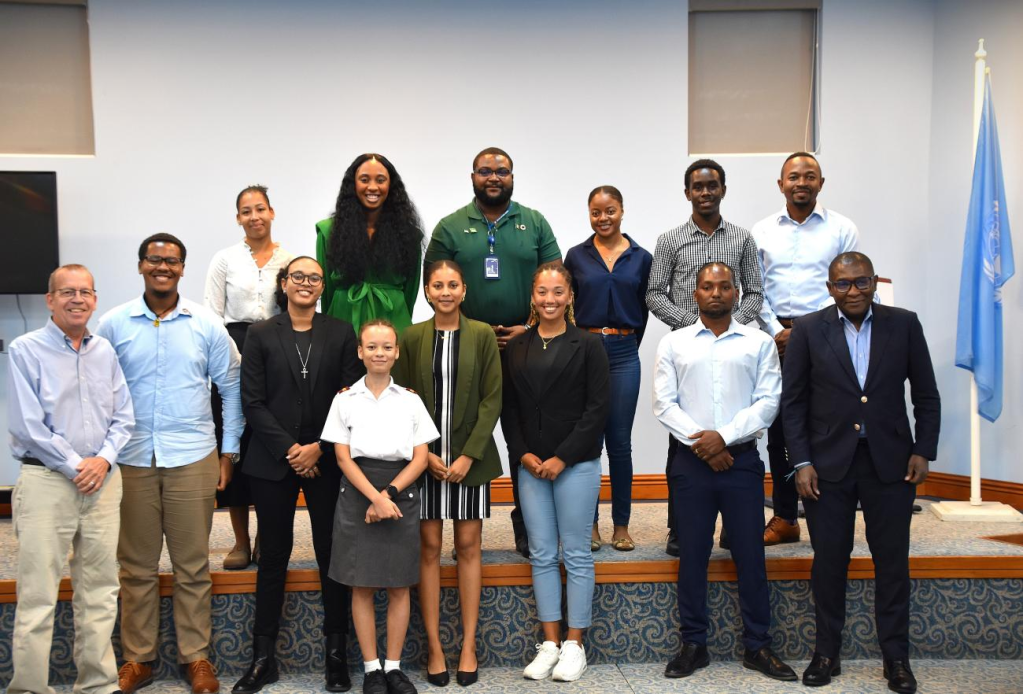
Story
17 February 2025
Boost road safety for people, planet and prosperity
The op-ed has been co-signed by 15 Heads of UN agencies/departments and by H.E. Mr. Abdessamad Kayouh, Minister of Transport and Logistics of the Kingdom of Morocco, Host of the 4th Global Ministerial Conference on Road Safety............................If you had to guess the leading cause of death for children and young people globally, what would you say? Malaria? Pneumonia? Suicide? They’re all up there, but no, it’s road crashes. Cars have been around for over 120 years, and we know how to prevent these tragedies. Yet road crashes still claim more than two lives every minute, and nearly 1.2 million lives every year. If these deaths were caused by a virus, it would be called a pandemic and the world would scramble to develop vaccines to prevent them. And yet reducing road deaths has long been overlooked, misunderstood and underfunded. People will always make mistakes on the roads, but we have proven solutions that ensure our transport systems can absorb these errors in a way that significantly reduces the risk of death. As part of the United Nations Sustainable Development Goals and the UN Decade of Action for Road Safety 2021-2030, the world has set an ambitious target of halving road deaths worldwide by 2030. Just ten countries - including some hard-hit low and middle-income countries – managed to reduce road deaths by more than 50% in a decade, and more than 30 countries are close behind. This shows that the target can be met but it is nowhere near enough. We need urgent action. Key to meeting this goal is the decision to design and build our transport systems for people - not for motor vehicles - and to make safety paramount in all decisions and actions. This is especially important for the most vulnerable road users such as pedestrians, cyclists and motorcycle riders, who are often left dangerously exposed. Advancing road safety is crucial in itself, but it is also key to sustainable development overall. The world is going through an unprecedented wave of motorization. More than a billion vehicles are on the roads. This is unsustainable, so we must focus on moving people, not cars, motorbikes and trucks. Transport accounts for one quarter of global carbon emissions, and fuels congestion in our cities. Yet when mobility is made safe and accessible, people choose the greener options of public transport, walking and cycling.Designing cities around sustainable transport - with cycling lanes, pedestrian zones, and accessible public transport - also strengthens communities by making spaces safer and more livable, while improving access to adequate housing and basic services for all.Safe roads power economies. Road deaths can cost countries around 3 to 5% of GDP, and ensuring more people can move safely to their jobs, schools and vital services drives development. Safe, accessible and affordable transport also breaks down barriers to jobs, schools and opportunities for disadvantaged groups. This helps ensure everyone can reach their potential.The same holds true for gender equality, and in some countries up to 80% of women report suffering harassment on public transport, so we must make transport safe for women and girls.Road safety is everyone’s business and to succeed we need a range of sectors to be involved. Urban planners and engineers must ensure safety is built into infrastructure. Academia and civil society can generate evidence. The media can dig deeper into what works, what doesn’t and why. The private sector has tremendous influence. Businesses can contribute to safe and sustainable mobility by applying proven principles and practices throughout their value chains. They must only sell vehicles that meet United Nations safety standards.Yet the role of government is paramount. Governments must provide strategic and well-coordinated approaches, strong policy and legal frameworks that enforce safety standards and safe behaviors, and sufficient funding. Law enforcement and education are also key. This vision is right at the heart of the Global Plan for the United Nations Decade of Action for Road Safety 2021-2030, which offers a blueprint for governments to reduce road deaths.This week, world leaders will meet for a Global Ministerial Conference on Road Safety in Morocco. They will assess progress, share knowledge, and advance actions to halve road deaths by 2030.They are set to adopt a new Marrakech Declaration, which recognizes road safety as an urgent public health and development priority, and that our efforts must be guided by the principles of equity, accessibility, and sustainability. The Declaration calls on leaders to step up efforts to action the Global Plan for the UN Decade of Action for Road Safety. We need a step change in political will, a sense of urgency, evidenced-based, strategies that are costed and implemented, strong coordination and adequate financing. Road safety is a crisis that has gone on far too long. No road deaths are necessary or acceptable. Yet it is also much more than that. Safe and sustainable mobility can power a better future for us all. ............................................The 4th Global Ministerial Conference for Road Safety takes place 18-20 February in Marrakesh, Morocco.The op-ed has been co-signed by 15 Heads of UN agencies/departments and by H.E. Mr. Abdessamad Kayouh, Minister of Transport and Logistics of the Kingdom of Morocco, Host of the 4th Global Ministerial Conference on Road Safety.Tedros Adhanom Ghebreyesus, Director-General of WHOJean Todt, UN Secretary-General’s Special Envoy for Road SafetyAchim Steiner, Administrator of UNDPRabab Fatima, Under-Secretary-General and High Representative for the Least Developed Countries, Landlocked Developing Countries and Small Island Developing StatesInger Andersen, UN Under-Secretary-General & Executive Director of UNEPAnaclaudia Rossbach, Executive Director of UN-HabitatFilippo Grandi, United Nations High Commissioner for Refugees (UNHCR)Jorge Moreira da Silva, Executive Director of UNOPSTatiana Molcean, UN Under-Secretary-General/Executive Secretary of UNECEArmida Salsiah Alisjahbana, Executive Secretary of UNESCAPClaver Gatete, Executive Secretary of UNECARola Dashti, Executive Secretary of ESCWAJosé Manuel Salazar-Xirinachs, Executive Secretary of UNECLACGilles Michaud, Under-Secretary-General for Safety and Security (UNDSS)Felipe Paullier, Assistant Secretary-General for Youth Affairs, filtered_html
1 of 5

Press Release
18 February 2025
Insurance top-up programme directing cash support to people affected by Hurricane Beryl
In Grenada alone, 34,000 people (30 percent of the population) required emergency assistance after Hurricane Beryl. Now, it is the first country to provide subsidies to people who lost income, under the Beryl Relief Income Support Programme (BRISP).WFP and CCRIF SPC (formerly the Caribbean Catastrophe Risk Insurance Facility) work together to link tropical cyclone and excess rainfall insurance policies with national social protection systems. Through an innovative model, financial support allows countries to top-up their sovereign insurance coverage on the condition that a fixed percentage of the payout is allocated for social assistance if and when policies are triggered. “Recognising the limited fiscal space of Caribbean governments, we know that it is crucial to strengthen national systems to ensure that support reaches the people who need it most, when disaster strikes,” said Brian Bogart, Representative of the WFP Caribbean Multi-Country Office. “Hurricane Beryl’s impact was significant, and many people are still struggling to recover. WFP is committed to supporting strategies that assist people as they recover, without increasing the long-term debt burden of small island nations and derailing progress on national development goals.”Chief Executive Officer of CCRIF, Mr. Isaac Anthony shared that “as the leading provider of parametric insurance coverage, in the Caribbean and Central America, we are pleased that CCRIF’s products offered to governments, can be used to make their social protection systems more shock responsive by facilitating vertical and horizontal expansion of social protection systems, when a country’s policy is triggered”. Citing the examples of Grenada and Jamaica, Mr, Anthony indicated that the government of Grenada received payouts under its tropical cyclone and excess rainfall policies from CCRIF as a result of Hurricane Beryl totalling US$ 43 million, of which US$4.6 million was allocated to social protection. WFP first introduced insurance policy top-up agreements in Dominica in 2021. Since then, WFP has helped expand the model to Belize, Dominica and Saint Lucia, with support from the European Union, the Government of Canada and the Global Shield Financing Facility. The Canada-CARICOM Climate Adaptation has recently provided funding to include Antigua and Barbuda, Grenada, Jamaica and Saint Vincent and the Grenadines. "In the face of increasing climate-related challenges, it is imperative that we strengthen our collaborative efforts to build resilience within our Caribbean communities,” said Isaac Solomon, Acting President of the Caribbean Development Bank. ” Innovative insurance models supported by CCRIF SPC and WFP are an effective method to get relief those most affected in a timely manner.”“Canada was keen to build on the work that started in 2021,” said Abebech Assefa, Head of Cooperation for the Eastern Caribbean at Canada's International Trade - Global Affairs Canada. “The idea to connect a portion of CCRIF SPC payouts to social protection systems helps ensure that these funds reach the most vulnerable people. The recent experience with Hurricane Beryl has provided an opportunity to put the concept to the test.” Caribbean small island developing states (SIDS) are on the frontline of climate change. The WFP Caribbean Multi-Country Office was established in 2018 and has since supported governments in scaling-up climate solutions, including early warning systems, anticipatory action and insurance to protect food-insecure communities. , filtered_html
1 of 5
Press Release
10 February 2025
UN Human Rights office engages future legal professionals on human rights in the Commonwealth Caribbean
NASSAU, BAHAMAS: On February 5, 2025, the CARICOM Regional Office of the United Nations Office of the High Commissioner for Human Rights (OHCHR) took a significant step in fostering human rights education by engaging with future legal professionals at the University of The Bahamas (UB). Regional Representative Michelle Brathwaite delivered an insightful presentation to third-year law students enrolled in the course Human Rights Law in the Commonwealth Caribbean. In addition, second-year Public International Law students and esteemed professors from the Law Faculty and Social Sciences attended the session, highlighting the broad interest in advancing human rights discourse in the region.The presentation provided an overview of the CARICOM Regional Office’s mission, detailing its geographical coverage and its thematic human rights priorities. The session emphasized how the office works within the broader framework of international human rights law, ensuring that human rights principles are embedded in policies and practices across CARICOM member states. During a vigorous question and answer session, students raised the matter of excessive incarceration rates, reparations for slavery and other issues which elicited deep and engaged conversation between the students, professors and the Regional Representative.By engaging with UB law students, the CARICOM Regional Office reaffirmed its commitment to strengthening legal awareness and capacity-building in human rights advocacy. This initiative aligns with the office’s broader goal of fostering a culture of rights-based governance across the region. The interactive session encouraged dialogue on the role of legal professionals in shaping inclusive and just societies and underscored the importance of regional collaboration in upholding fundamental rights.Ms. Brathwaite stressed that, while there are matters requiring the attention of the office, “There is work being done in the region (to advance human rights).”As the CARICOM Regional Office continues its advocacy and outreach, partnerships with academic institutions like UB will remain vital in empowering the next generation of human rights defenders. Ms. Brathwaite added that in addition to tertiary institutions like UB, civil society organisations (CSOs), non-governmental organisations (NGOs) and national governments provide exciting avenues for potential partnerships.Stay connected for more updates on our work in advancing human rights, equality, and justice across the Caribbean., filtered_html
1 of 5
Press Release
28 January 2025
Charge youth group promoting climate change and health action in Saint Lucian primary schools
Castries, Saint Lucia, 28 January 2025 (PAHO/WHO) – Saint Lucian youth group Climate and Health Action for the Rising Generation (CHARGE) recently engaged 108 students including 55 males and 53 females, and 51 teachers from 50 primary schools to take collective responsibility for climate change and health action at the second national primary school climate change and health initiative. CHARGE is an affiliate of the University of the West Indies (UWI) Climate Change and Health Leaders Fellowship Training Program, one aspect of the European Union/CARIFORUM Strengthening Climate Resilient Health Systems in the Caribbean project, coordinated by the Pan American Health Organization.Held from 16-17 January under the theme "Promoting Climate Change and Health Awareness in Primary Schools in Saint Lucia: Act Now for a More Sustainable and Resilient Future," itcovered all eight school districts across the across the island. The four-hour interactive sessions were held at the Orchid Garden in Union, Castries, and the Micoud Multipurpose Centre, Micoud and combined education and entertainment. Activities included question-and-answer segments to reinforce knowledge and increase awareness dance, treasure hunts, role-play, and craft to foster creativity, problem solving and teamwork. This year, the initiative introduced a long-term component that culminates in June. CHARGE, in collaboration with its partners, will work with selected primary schools to establish or improve school kitchen gardens by providing support in sustainable cultivation practices.“The program is designed as a dynamic and interactive learning experience that highlights the importance of personal health, the environment, their relationship and the impacts of climate change on health and that of the community through exercise and healthy diets, implementing the three Rs – Reduce, Reuse, and Recycle – and planting to promote sustainability,” said President, Kezia St Brice-Isidore. “Through this initiative, we are not only equipping students with knowledge and practical tools but also empowering them to take ownership of their learning and environment. By blending education with creativity and active engagement, we aim to inspire a generation of problem-solvers who are aware, responsible, and ready to lead,” she emphasised.CHARGE was born out of the passion fueled by Dr Kim Newton-James, a 2021 graduate of the UWI Fellowship’s first cohort. Dr Newton-James, who is passionate about highlighting the linkages between the physical environment and public health, went beyond training the youth. She spurred youth engagement and action at the community level. The participants used their cell phones to capture scenes that depicted the impact of climate change on their communities and develop solutions. Several members of CHARGE, including its Mrs St. Brice-Isidore, participated in this project."I am extremely happy to see the youth participants of my project rise to the challenge and turn their solutions into action. Through CHARGE, they are exemplifying the power of 'youth teaching youth’, inspiring students to take meaningful action for climate change and health. This initiative showcases the transformative impact of youth leaders driving change for a more sustainable future," Dr Newton-James asserted.CHARGE partners with several organizations, including the Saint Lucia Ministry of Youth Development and Sports; the Department of Education; the Technical Vocational Education and Training Unit, the Department of Sustainable Development within the Ministry of Education, Sustainable Development, Innovation, Science, Technology, and Vocational Training; the Bureau of Health Education within the Ministry of Health, Wellness, and Elderly Affairs; and the Sir Arthur Lewis Community College.The initiative was funded by the U.S. Embassy in Bridgetown, Barbados, through the 2024 Alumni Engagement Innovation Fund of the U.S. Department of State, accessed by Fullbright Scholars, Dr Newton-James and Dr Winston Phulgence, Vice Principal, Academics, at the Sir Arthur Lewis Community College.Learn more about CHARGE. Learn more about the EU/CARIFORUM Climate Change and Health Project.Learn more about the UWI Climate Change and Health Leaders Fellowship Programme.*** END *** CONTACT: Lisa Bayley - bayleylis@paho.org, PAHO/WHO Office of the Subregional Program Coordination (Caribbean)About the Pan American Health Organisation: The Pan American Health Organization (PAHO) works with the countries of the Americas to improve the health and quality of life of its population. Founded in 1902, it is the world’s oldest international public health agency. It serves as the Regional Office of WHO for the Americas and is the specialized health agency of the Inter-American system.The PAHO Subregional Program is responsible for providing subregional technical cooperation and to strengthen PAHO’s engagement with the Caribbean Subregional integration mechanisms, the Caribbean Community (CARICOM) and its various bodies and organs; and to build synergistic partnerships with the West Indies (UWI), among others. PAHO’s subregional technical cooperation specifically focuses on public health issues which would benefit from economies of scale and for which agreement on proposed collective responses and actions would produce a far greater impact rather than individual country responses. The Subregional Program also plays a role in coordinating among the different PAHO country offices., filtered_html
1 of 5
Press Release
24 January 2025
Isiuwa Iyahen to serve as Head of Office ad interim at UN Women Caribbean
The UN Women Multi-Country Office (MCO) – Caribbean is pleased to introduce Ms. Isiuwa Iyahen as the Head of Office ad interim. In her new role, Ms. Iyahen is responsible for the day-to-day management of the MCO, leading the design, implementation, management and oversight of programmes and operations to ensure effective and efficient delivery of results.Ms. Iyahen has served as Deputy Representative from April 2022 to January 2025. Prior to this, Ms. Iyahen managed the Economic Empowerment and Statistics portfolios for the UN Women MCO -Caribbean. In that capacity, her technical leadership resulted in narrowing significant knowledge, research, and gender data gaps on violence against women and girls, the labour force, social protection, and unpaid care work in CARICOM.She has over 20 years of experience in international development and has served in various capacities within the United Nations system and non-governmental organisations.Ms. Iyahen holds a Master of Public Policy degree from the University of Minnesota’s Hubert Humphrey Institute of Public Affairs and a Bachelor of Arts degree in Political Science from Swarthmore College.We look forward to Ms. Iyahen’s continued leadership as she continues to champion initiatives that foster equality and drive meaningful change across the Caribbean. , filtered_html
1 of 5
Press Release
09 January 2025
Short-term outlook for Latin America and the Caribbean remains stable, according to UN flagship report
Mexico, 10 January 2025 – The economic outlook in Latin America and the Caribbean is expected to strengthen, supported by more robust household spending and easing monetary policies, according to the UN World Economic Situation and Prospects (WESP) 2025. However, the region faces major downside risks, including domestic political uncertainties and weaker-than-anticipated external demand.The UN flagship economic report projects that global growth will remain at 2.8 per cent in 2025, unchanged from 2024. While the world economy has demonstrated resilience, withstanding a series of mutually reinforcing shocks, growth remains below the pre-pandemic average of 3.2 per cent, constrained by weak investment, sluggish productivity growth, and high debt levels.The report notes that lower inflation and ongoing monetary easing in many economies could provide a modest boost to global economic activity in 2025. However, uncertainty still looms large, with risks stemming from geopolitical conflicts, rising trade tensions, and elevated borrowing costs in many parts of the world. These challenges are particularly acute for low-income and vulnerable countries, where sub-par and fragile growth threatens to further undermine progress towards the Sustainable Development Goals (SDGs).“Countries cannot ignore these perils. In our interconnected economy, shocks on one side of the world push up prices on the other. Every country is affected and must be part of the solution—building on progress made,” said António Guterres, United Nations Secretary-General, in the foreword to the report. “We’ve set a path. Now it’s time to deliver. Together, let’s make 2025 the year we put the world on track for a prosperous, sustainable future for all.”The short-term outlook for Latin America and the Caribbean remains moderately favourable. Regional GDP growth is expected to accelerate from an estimated 1.9 per cent in 2024 to 2.5 per cent in 2025. Economic growth is being driven by improvements in private consumption, easing monetary policies, resilient capital flows, and stronger export growth.However, there are significant downside risks to this outlook. On the external front, a sharper-than-expected slowdown in China and the United States would negatively impact exports, remittances, and capital flows. On the domestic front, political uncertainties could dampen business confidence and investments. Climate-related shocks, particularly in the Caribbean, could also strain fiscal policies and disrupt agricultural production, driving up food inflation.In Brazil, growth is expected to decelerate from 3.0 per cent in 2024 to 2.3 per cent in 2025, remaining well above the 2010–2019 average of 1.4 per cent. This slowdown reflects headwinds from tighter monetary policy, reduced fiscal spending, and weaker exports. In Mexico, GDP growth is expected to remain sluggish. After an estimated expansion of 1.6 per cent in 2024, GDP is projected to grow by 1.3 per cent in 2025, constrained by weak private consumption and fiscal consolidation efforts. The economy in Argentina is recovering after two years of contraction, driven by a revival in private consumption and robust investment growth. In the Dominican Republic, Guyana, and Paraguay, GDP growth is projected to remain above 3.5 per cent in 2025.In the Caribbean (excluding Guyana), economic growth is estimated at 2.5 per cent for 2024 and is expected to remain unchanged in 2025 as the effects of the post-pandemic rebound in tourism fade. Although GDP growth is significantly above the 0.5 per cent average recorded between 2010 and 2019, it remains insufficient to improve living conditions.Although the outlook is resilient, economic growth has remained sluggish for over a decade. Between 2015 and 2024, regional GDP growth averaged just 0.9 per cent—the lowest rate for any decade since the 1950s. Thus, per capita GDP remains stagnant, stuck at the same level as ten years ago. In order to improve labour market outcomes, raise living standards, and advance the SDGs, it is crucial to accelerate economic growth.Critical minerals: A vital opportunity for accelerating sustainable developmentThe report highlights the potential of critical minerals for the energy transition—such as lithium, cobalt, and rare earth elements—and also for accelerating progress towards the SDGs in many countries.For resource-rich developing countries, including several in Latin America and the Caribbean, rising global demand for critical minerals presents a unique opportunity to boost growth, create jobs, and increase public revenues for investment in sustainable development. However, the report warns that these opportunities come with significant risks. Poor governance, unsafe labour practices, environmental degradation, and over-reliance on volatile commodity markets could exacerbate inequalities and harm ecosystems, undermining long-term development gains.“Critical minerals have immense potential to accelerate sustainable development, but only if managed responsibly,” said Li Junhua, United Nations Under-Secretary-General for Economic and Social Affairs. “Governments must adopt forward-looking policies and comprehensive regulatory frameworks to drive sustainable extraction, equitable benefit-sharing, and investments in building productive capacities to maximize the development gains from these resources.”The report will be available on 9 January 2025, 12:30 pm EST on https://www.bit.ly/UN_WESP2025 and desapublications.un.org once the embargo has been lifted.Hashtag: #WorldEconomyReportMedia Contacts:
Alex del Castello, UN Department of Global Communications, alexandra.delcastello@un.org
Helen Rosengren, UN Department of Economic and Social Affairs, rosengrenh@un.org, filtered_html
Alex del Castello, UN Department of Global Communications, alexandra.delcastello@un.org
Helen Rosengren, UN Department of Economic and Social Affairs, rosengrenh@un.org, filtered_html
1 of 5
Latest Resources
1 / 11
Resources
24 July 2024
Resources
09 July 2024
Resources
09 October 2024
1 / 11


